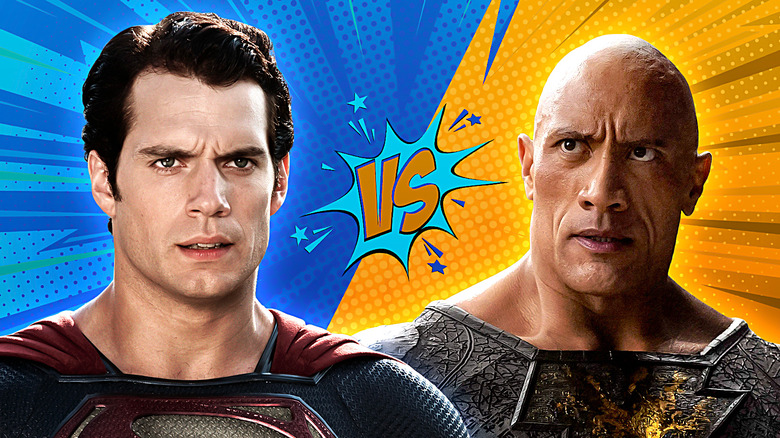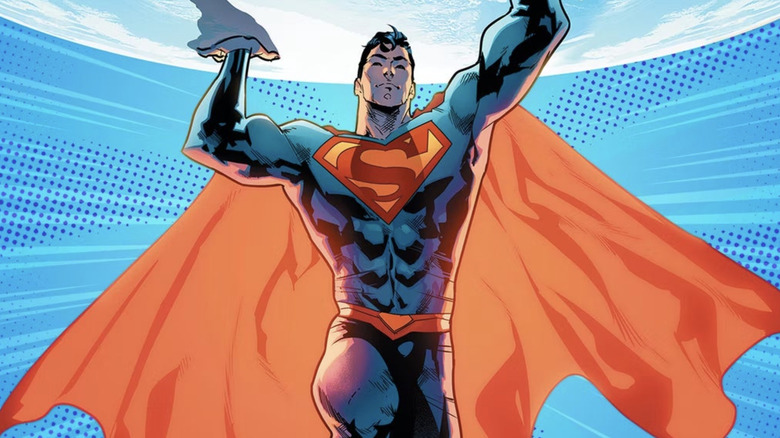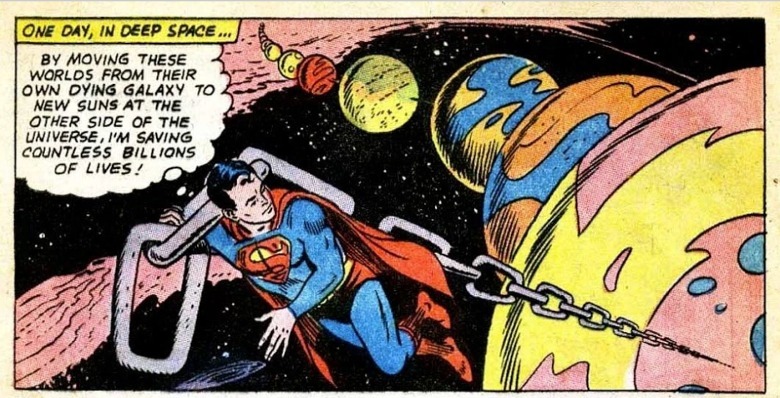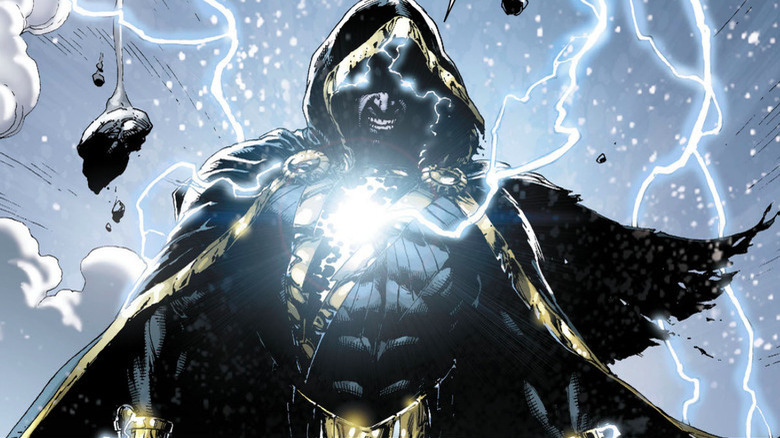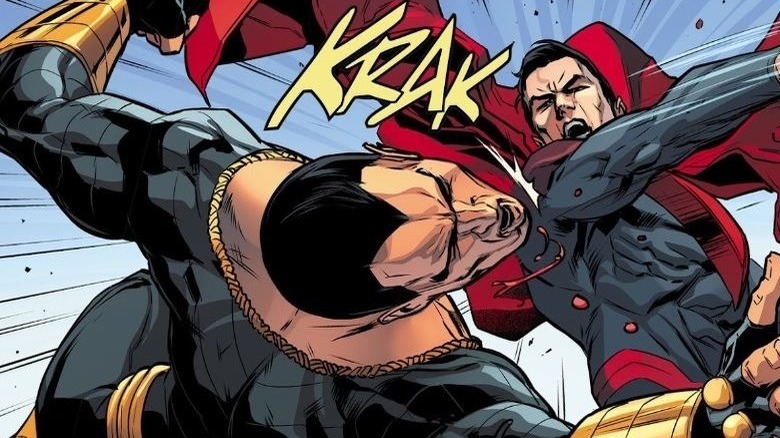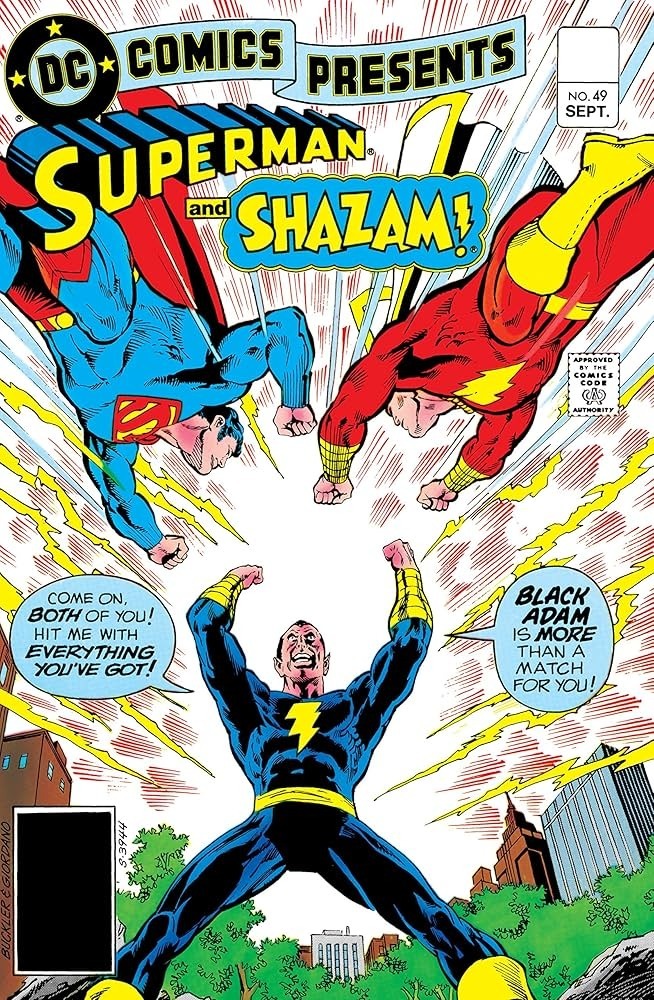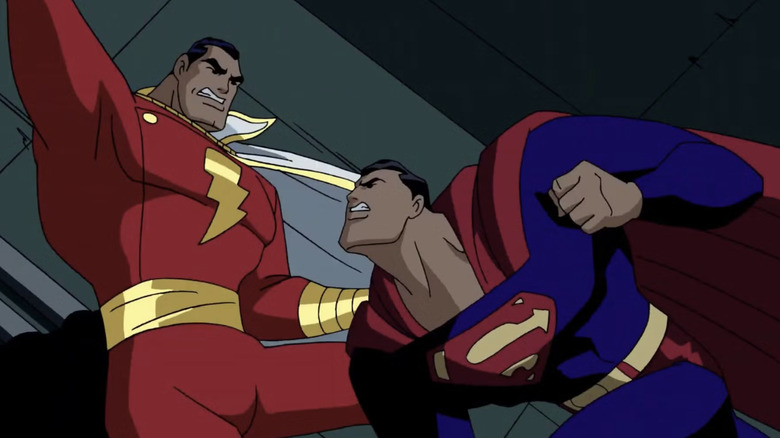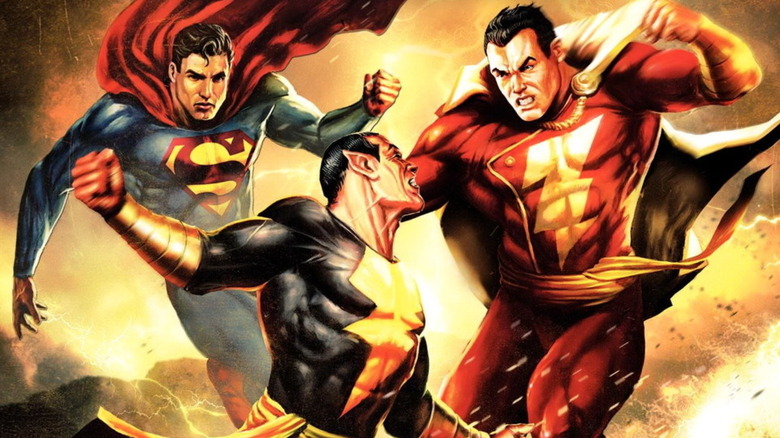Black Adam Vs Superman: Who Is Actually Stronger?
The superhero movie boom has produced some comic calamities (from "Fant4stic" to "Madame Web"), but none more so than 2022's "Black Adam." Star Dwayne Johnson/The Rock had been attached to star as Black Adam since 2007. Once the picture finally got rolling, he spent years hyping up that "the hierarchy of power in the DC Universe is about to change," suggesting Black Adam would become the new star around which other DC films would orbit.
Then the movie arrived to pretty bad reviews (read /Film's 3.5/10 "Black Adam" review here) and middling box office returns. Not even a post-credits scene cameo of Henry Cavill as Superman generated much excitement, even though Johnson had also been banking on a sequel where his Mighty Adam would face the Man of Steel. Johnson began his performing career as a wrestler, so naturally he wanted to center his superhero passion project around a fight between two heavyweights.
Alas, James Gunn has no plans for Black Adam in his rebooted DC Films, so we won't see the villain tangle with David Corenswet's new Superman. Fans are thus left hanging, desperate to know who would win if these two flying bricks clashed. The answer? I'll let Smilin' Stan Lee take it away:
"Anyone should know this. The person who'd win in a fight is the person that the scriptwriter wants to win! [...] These are fictitious characters! The writer can do whatever he wants with them!"
Indeed, comic book fans have a bad habit of treating these funny books like historical documents. There's no absolute answer to "is x stronger than x?" because these characters have been reinterpreted countless times and so their powers are fluid.
In the end, though, Superman will win against Black Adam. Why? He's the hero, and Black Adam is a villain. In superhero comics, the good guys always win. It is the fundamental law of the universe, meta-textually and literally. In "JLA: Earth-2" by Grant Morrison and Frank Quitely, the Justice League visit a polar opposite Earth, where their counterparts are the evil Crime Syndicate. Their attempts to help this world fail, because on this Earth, evil is destined to triumph in the same way that goodness is on theirs.
During their "JLA" run, Morrison coined the term "Darkseid Is," a refrain by the God of Evil's worshippers to show his eternal, ethereal presence. In "Final Crisis," Morrison developed the answer to this: "Superman Can." Evil endures, but it can always be overcome. Superman is a beacon of light that snuffs out Darkseid because of his strength of will. He's stronger because he has the power of a god but chooses to be just a man, and a kind one. Like Optimus Prime, Superman is "strong enough to be gentle."
That Black Adam wields his power to be a vengeful villain and a conqueror? It's a sign of weak character, not awesomeness.
The strengths and weaknesses of Superman
Everyone knows the key powers of Superman: super-strength and super-speed. Greatly enhanced senses. Bulletproof skin. Flight. Heat vision, X-ray vision and (sometimes) freezing cold breath.
Thing is, he didn't always have these powers. In Superman's earliest appearances (starting from "Action Comics" #1 in 1938) from his creators Jerry Siegel and Joe Shuster, he was only strong and tough. He didn't fly, but instead "leapt tall buildings in a single bound." The X-ray vision and super-hearing came a few issues later in "Action Comics" #11, then the heat vision in 1949.
The Silver Age of Comic Books (the 1950s to 1960s, when superheroes were unapologetically ridiculous) is when Superman truly became a god in human form. Across issues, he'd pull off feats like moving whole planets through space.
Superman has these powers because he's an alien from the planet Krypton. In 1959, Otto Binder (the co-creator of Black Adam) and Jim Mooney elaborated on this: Superman's Kryptonian physiology absorbs the solar energy of Earth's yellow sun and gives him his powers.
Superman's weakness, introduced in 1940s radio show "The Adventures of Superman," is Kryptonite: radioactive green chunks of Krypton's surface. He is also vulnerable to magic. The mere presence of magic doesn't weaken him like Kryptonite does, but magic-infused attacks can seriously hurt him. That vulnerability gives Black Adam his greatest edge over Superman. It evens out, though, because Black Adam's powers aren't as varied or flexible as Superman's.
The strengths and weaknesses of Black Adam
Black Adam's numerous superpowers are broadly similar to Superman's: He can fly, he's super-strong, and has super tough skin. Instead of heat vision, though, he has lightning blast powers that stem from his magical origin.
Black Adam is not a Superman villain, he's the counterpart of Captain Marvel/Shazam. (The former was the character's original name, but it's been discontinued in recent years due to a competing copyright by Marvel Comics.) In "Whiz Comics" #2, young Billy Batson meets a wizard who judges him pure of heart and so gives him powers. Billy need only say the word "Shazam!" and then a lightning bolt will turn him into a flying, superhuman adult man. "Shazam" is not just a magic word, it's an acronym for his abilities and the legendary heroes he draws from:
-
Wisdom of Solomon
-
Strength of Hercules
-
Stamina of Atlas
-
Power of Zeus
-
Courage of Achilles
-
Speed of Mercury
Lightning is sometimes associated with gods (see the aforementioned Zeus), so Captain Marvel is too. Notice the lightning bolt insignia on both his and Black Adam's costumes.
Black Adam debuted in 1945's "The Marvel Family" #1, revealed as the Wizard's original champion who was corrupted by power. 5000 years ago, in the cradle of civilization (originally Egypt, nowadays changed to fictional country Kahndaq), a wizard bestowed the man Teth-Adam with superhuman powers. Black Adam also had to say "Shazam!" in order to initially activate his powers, but they pull from the Egyptian pantheon instead of mostly Greek heroes like Captain Marvel:
-
Stamina of Shu
-
Speed of Horus
-
Strength of Amon
-
Wisdom of Zehuti
-
Power of Aten
-
Courage of Mehen
Black Adam's default appearance is his powered-up form. If he says "Shazam!" he loses his powers — and since he's 5000 years old, that's a big problem. In his first appearance, he's tricked into saying "Shazam!" and then crumbles into dust. This ending is reused in the 2010 animated short "Superman/Shazam!: The Return of Black Adam" and again in Geoff Johns and Gary Frank's 2012 "Shazam!" comic reboot.
Captain Marvel and Black Adam's strengths have always been contrasted with the seven deadly sins. Black Adam's weakness shows in how he let those vices conquer him.
The history of Superman and Black Adam, explained
If Johnson had gotten the Superman vs. Black Adam brawl he wanted, I'm pretty sure Black Adam would've won. (Again, it's not the characters' actual strength that decides how these fights go.) Johnson reportedly has a clause in his acting contracts that says he can never lose a fight onscreen. The chance to fight Superman, and boast about beating him, seems to be a big part of what drew him to playing Black Adam in the first place. However, before the plans for the Black Adam Cinematic Universe were washed away, Johnson reportedly pitched a years-spanning saga pitting Superman and Black Adam against each other. It seems Johnson's vision wasn't just one fight, but a repeated battle between two mortal-born Gods with different outlooks on how to protect the world.
Writing about Geoff Johns' Black Adam's 21st century revamp at Comic Book Herald, Ritesh Babu observed that Geoff Johns, too, sees Black Adam as a Superman foil. "Black Adam is the answer to 'What if the Superman archetype used his power to rule?'" Babu writes. "To Geoff Johns, Black Adam is not a Shazam! villain. He is so much more. He is a figure of great grandeur, majesty and scope that enhances and enriches the DC Universe."
In Johns and Gary Frank's misguided "Watchmen" sequel "Doomsday Clock," Black Adam leads a global superhuman revolution. Superman, not Captain Marvel, is the figure that stands in his way. Indeed, Johnson's "Black Adam" movie pulls mostly from Johns' comics. The Justice Society of America feature in the movie because Johns first started writing Black Adam while penning the ongoing "JSA" comic. During the New 52 DC Comics reboot, Johns rewrote Black Adam's origin: it was actually Teth-Adam's nephew chosen as the Wizard's champion, but Adam stole the power to crush their former oppressors. The movie, too, uses a backstory closer to this than Otto Binder's original.
Even putting aside Johns' stories, Superman and Black Adam have crossed paths (and fought) several times. The earliest Superman and Captain Marvel crossovers, "All-New Collectors' Edition" #C-58 and "DC Comics Presents" #49, feature Black Adam too. The cover of the latter features the two heroes flying towards Black Adam, who stands tall and dares them to challenge him.
In 2005's "Action Comics" #831 (written by Gail Simone, drawn by John Byrne), Superman and Black Adam fight one-on-one. Superman is winning, until Black Adam turns his back to a charging Superman; he knows an honorable hero wouldn't punch him from behind.
Conversely, in Johns and David Finch's 2013 crossover "Forever Evil," Black Adam fights Ultraman, the evil Superman from Earth-3. Adam makes Ultraman bleed, but he shrugs off the lightning blast and crushes Adam's jaw to prevent him saying "Shazam!" again. If Superman was willing to be lethal, Black Adam would fall. "Injustice: Gods Among Us" features a similar outcome when an evil Superman snaps and kills the Shazam of his universe. Kryptonian strength still trumps Shazam and Black Adam's magical invulnerability.
Why Superman so often fights Captain Marvel/Shazam (and Black Adam)
Since Black Adam has fundamentally the same powers as Shazam, one can use the many fights between Superman and Shazam as proxies for weighing Superman vs. Black Adam.
In the aforementioned "All-New Collectors' Edition" #C-58, Superman and Captain Marvel are manipulated into fighting by the villainous Karmang. It's a long and even-handed fight but Superman scores a knockout punch. The sight of the beaten Captain Marvel, and realization of what he did, snaps him back to his senses. At the same time, Supergirl is also shown to overcome Black Adam.
Mark Waid and Alex Ross' 1996 opus "Kingdom Come" features an aged Superman fighting a Captain Marvel brainwashed by Lex Luthor. Superman overcomes this by pushing the Captain into one of his own lighting bolts, then holding the transformed Billy Batson's mouth shut.
In the animated "Justice League Unlimited" episode "Clash," Superman and Captain Marvel fight (Superman finds it grating that there's a hero even more Boy Scout-like than him). The battle climaxes with Captain Marvel holding Superman over his head, repeatedly shouting "Shazam!" for the lighting to come down and strike Superman. The attacks are painful, but Superman overpowers Captain Marvel and makes sure the final bolt hits him instead. The fight ends with Superman stunned by the sight of an unconscious Billy Batson and realizing he's been a tad unfair by acting so annoyed with Captain Marvel.
"Superman/Shazam!: The Return of Black Adam" loosely combines Captain Marvel's origin with Black Adam's first appearance, while also throwing in Superman as Billy Batson's heroic idol. Before Billy gets his powers, Superman struggles one-on-one with Black Adam. They're physical equals, but Superman is vulnerable to his magic lightning. Superman holds his own, though, by surprising Black Adam with all his powers like Heat Vision.
Captain Marvel physically defeats Black Adam, but Superman shows off his true strength by convincing Billy to stay his hand against a defeated opponent. "Good is hard, bad is always easy," Superman reminds him. Basically, Black Adam wasn't strong enough to control himself like Superman and Captain Marvel are.
So, why is Superman and Captain Marvel/Shazam such a common battle match-up? It's not just because they have such similar powers and designs, which itself isn't a coincidence. You see, their first battle was in court.
Shazam and Black Adam were not originally DC characters like Superman
Captain Marvel's comics weren't originally published at DC Comics. He was owned by Fawcett Comics (hence Billy Batson hailing from Fawcett City). Captain Marvel debuted two years after Superman and was accused of being a rip-off. Cape wearing superheroes were still a novel idea in 1940, and Billy Batson was also depicted as a junior radio journalist who stayed close to the news so he could stop in-progress crimes — much like Superman did as intrepid reporter Clark Kent.
National Comics (the original name of DC) certainly thought their publication had been plagiarized. (That Captain Marvel was outselling Superman probably added salt to that wound). This led to the lawsuit "National Comics Publications, Inc. v. Fawcett Publications, Inc." which carried on from 1941 to 1951. The case was ultimately decided in favor of National/DC. Fawcett decided to settle out of court instead of appealing further, so "The Marvel Family" comic book was abruptly canceled in 1953.
Then, in the 1970s, DC licensed the old Fawcett characters. Their world ("Earth-S") was depicted as one of many in the DC multiverse. DC acquired full ownership of Captain Marvel (and associated characters like Black Adam) in 1991, and they've remained in DC's stable ever since.
The question of who ripped off who, though, is more complex than it seems. Superman debuted first, but the original Superman was quite different from the current one. Captain Marvel could fly from the beginning, and his bald mad scientist nemesis Dr. Sivana feels like proto Lex Luthor. Did the plagiarism go both ways? Further muddying the waters is that Otto Binder started writing Superman after Captain Marvel was shuttered. His Superman comics are spiritually in-line with his Captain Marvel ones, and helped make the heroes more and more similar.
Superman has surpassed both Captain Marvel, and Black Adam, in not only his power but also public fame. Superman is synonymous with comic books now, and he simply has too much lead time for the "Shazam!" characters to catch up. Even the strength of Hercules and Amon pales in comparison to the power of a skilled lawyer.
